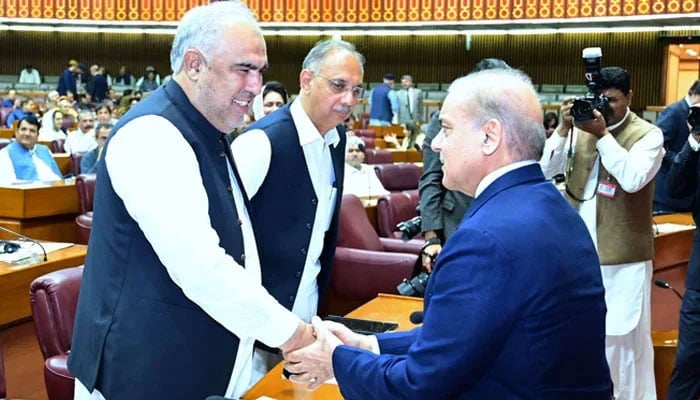Elusive dialogue
Pakistan’s politics has become a source of confusion rather than clarity
In a time of unprecedented political chaos, the notion of dialogue among Pakistan’s political entities has become a source of confusion rather than clarity. The PTI and PML-N have both sent mixed signals, leaving the nation to wonder if a political dialogue, grand or otherwise, will ever materialize. The back-and-forth between these parties has not only deepened political uncertainty but has also revealed the fractures within each party regarding their stance on engaging in talks. The recent statements by PTI Chairman Barrister Gohar Khan and PML-N leadership highlight the contradictory positions within the parties. On the one side, the PTI denies initiating any dialogue with the PML-N, despite reports suggesting otherwise. On the other, the PML-N appears divided, with some leaders advocating for talks while others remain vehemently opposed, particularly in light of the events of May 9, which still resonate negatively within the party. The public exchange of denials and confirmations between these parties has done little to inspire confidence in a unified approach to resolving the political impasse. PML-N supremo Mian Nawaz Sharif has reportedly called for all political parties, governments, and institutions to come together to steer the country out of the current crises. However, this has been denied by some senior PML-N leaders while others have questioned the PTI’s sincerity and conditioned any potential talks on a formal apology from Imran Khan’s party. This internal discord within the PML-N further complicates the prospect of a meaningful dialogue.
Meanwhile, the PTI’s stance, as articulated by spokesperson Raoof Hasan, indicates a clear preference for engaging with the establishment rather than political rivals, suggesting that the party sees the establishment as the real power brokers, a belief rooted in their previous experience during the 2018 elections. So what is going on and why is there so much confusion about a political dialogue? Critics argue that Imran Khan’s reluctance to engage with other political parties stems from his political strategy of positioning himself as the opposition to all other politicians, which makes dialogue seem rather counterproductive to his rhetoric. Political analysts have long advocated for dialogue as the only viable solution to the political gridlock that has gripped the country. Without open communication and cooperation, our political landscape will continue to be dominated by uncertainty and instability. A new charter of democracy, potentially paired with a charter of economy, is possibly the only means to bridge the gaps between political factions and lay the groundwork for long-term stability. However, even among those who support the idea of a new charter, there is disagreement over its potential effectiveness. Some believe that it could gradually dismantle the current hybrid political model, allowing for a return to a more transparent and democratic system. Others are more sceptical, arguing that the hybrid model is too deeply entrenched to be easily removed and that even a grand dialogue may not be enough to bring about significant change.
One alternative that has gained some traction is the idea of a grand dialogue that includes not only political parties but also institutional leadership. Such a dialogue could clarify the roles and responsibilities of each institution, thereby reducing the confusion that currently plagues the political environment. However, there is much that lies between the wishful thinking that goes with wanting something like this and actually making it happen. Ultimately, the reluctance of key stakeholders to commit to talks, the divisions within parties, and the persistent mistrust between political entities all contribute to a political stalemate that shows no signs of resolution. Until there is a clear and unified approach to dialogue, Pakistan’s political future will remain uncertain, with the risks of further instability growing by the day.
-
 Factory Explosion In North China Leaves Eight Dead
Factory Explosion In North China Leaves Eight Dead -
 Blac Chyna Opens Up About Her Kids: ‘Disturb Their Inner Child'
Blac Chyna Opens Up About Her Kids: ‘Disturb Their Inner Child' -
 Winter Olympics 2026: Milan Protestors Rally Against The Games As Environmentally, Economically ‘unsustainable’
Winter Olympics 2026: Milan Protestors Rally Against The Games As Environmentally, Economically ‘unsustainable’ -
 How Long Is The Super Bowl? Average Game Time And Halftime Show Explained
How Long Is The Super Bowl? Average Game Time And Halftime Show Explained -
 Natasha Bure Makes Stunning Confession About Her Marriage To Bradley Steven Perry
Natasha Bure Makes Stunning Confession About Her Marriage To Bradley Steven Perry -
 ChatGPT Caricature Prompts Are Going Viral. Here’s List You Must Try
ChatGPT Caricature Prompts Are Going Viral. Here’s List You Must Try -
 James Pearce Jr. Arrested In Florida After Alleged Domestic Dispute, Falcons Respond
James Pearce Jr. Arrested In Florida After Alleged Domestic Dispute, Falcons Respond -
 Cavaliers Vs Kings: James Harden Shines Late In Cleveland Debut Win
Cavaliers Vs Kings: James Harden Shines Late In Cleveland Debut Win -
 2026 Winter Olympics Snowboarding: Su Yiming Wins Bronze And Completes Medal Set
2026 Winter Olympics Snowboarding: Su Yiming Wins Bronze And Completes Medal Set -
 Trump Hosts Honduran President Nasry Asfura At Mar-a-Lago To Discuss Trade, Security
Trump Hosts Honduran President Nasry Asfura At Mar-a-Lago To Discuss Trade, Security -
 Cuba-Canada Travel Advisory Raises Concerns As Visitor Numbers Decline
Cuba-Canada Travel Advisory Raises Concerns As Visitor Numbers Decline -
 Anthropic Buys 'Super Bowl' Ads To Slam OpenAI’s ChatGPT Ad Strategy
Anthropic Buys 'Super Bowl' Ads To Slam OpenAI’s ChatGPT Ad Strategy -
 Prevent Cancer With These Simple Lifestyle Changes
Prevent Cancer With These Simple Lifestyle Changes -
 Air Canada Flight Diverted St John's With 368 Passengers After Onboard Incident
Air Canada Flight Diverted St John's With 368 Passengers After Onboard Incident -
 Experts Reveal Keto Diet As Key To Treating Depression
Experts Reveal Keto Diet As Key To Treating Depression -
 Inter Miami Vs Barcelona SC Recap As Messi Shines With Goal And Assist
Inter Miami Vs Barcelona SC Recap As Messi Shines With Goal And Assist




